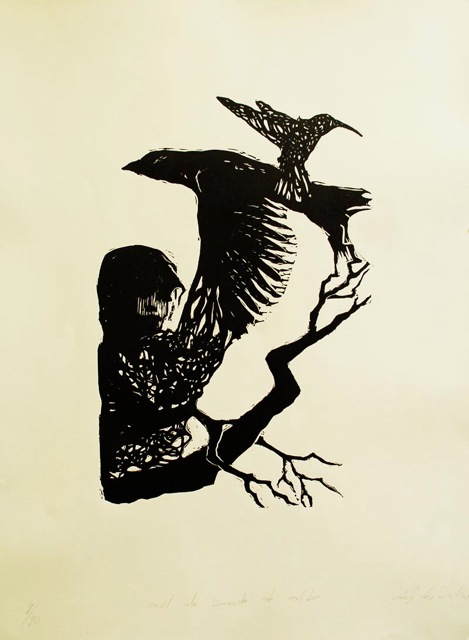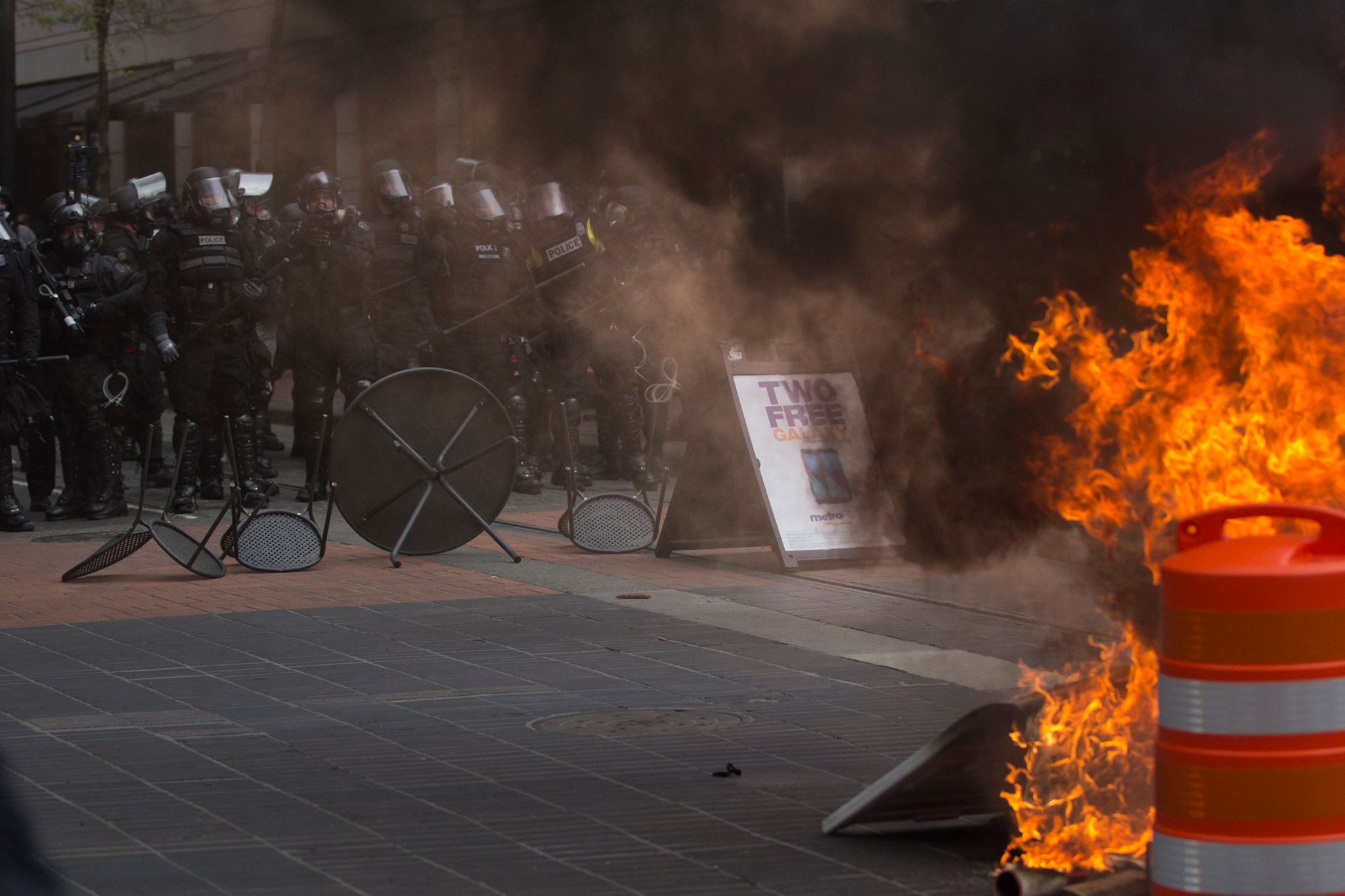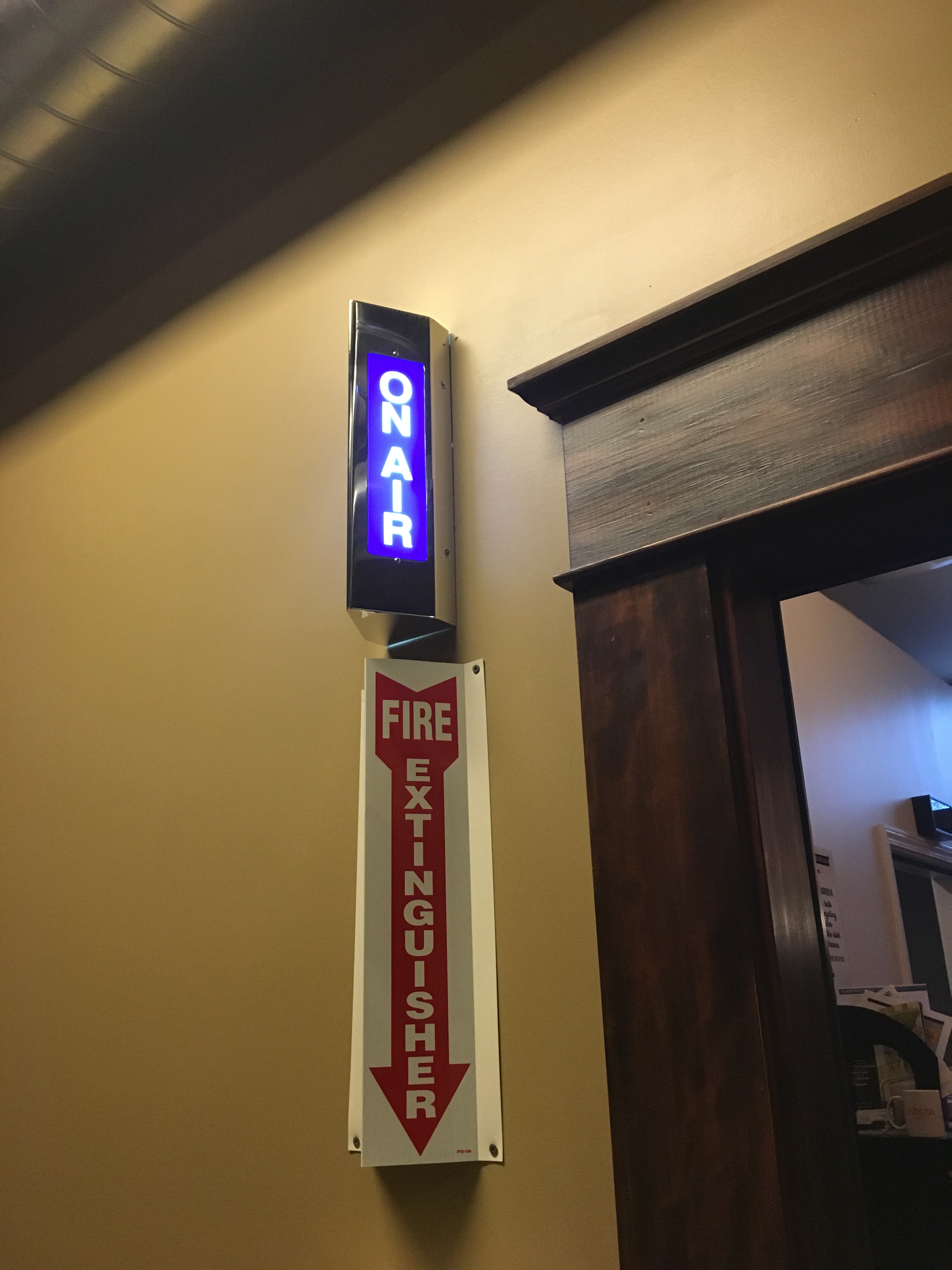 Lara Messersmith-Glavin and Kristian Williams, of the Institute for Anarchist Studies and Perspectives on Anarchist Theory journal collective, and Ayme Ueda, of the Black Rose Anarchist Federation / Federación Anarquista Rosa Negra, recently appeared on X-RAY FM in Portland, Oregon. The show is called Group Therapy, hosted by Natalie Sept. This episode features an hour discussion of topics including what anarchism is, what anarchists want and do, anarchist critiques of the world, and challenges anarchists face. Listen in below!
Lara Messersmith-Glavin and Kristian Williams, of the Institute for Anarchist Studies and Perspectives on Anarchist Theory journal collective, and Ayme Ueda, of the Black Rose Anarchist Federation / Federación Anarquista Rosa Negra, recently appeared on X-RAY FM in Portland, Oregon. The show is called Group Therapy, hosted by Natalie Sept. This episode features an hour discussion of topics including what anarchism is, what anarchists want and do, anarchist critiques of the world, and challenges anarchists face. Listen in below!
#IAS
Anarchist Theory & Action Camp
The Institute for Advanced Troublemaking Anarchist Summer Camp will be held August 11th – 18th, 2017 in Worcester, MA.
Maia Ramnath, Institute for Anarchist Studies (IAS) and Perspectives on Anarchist Theory journal collective member; Cindy Milstein and Todd May, former IAS board members; and Hillary Lazar, IAS writing grant recipient, and author of the essay “Until All Are Free: Black Feminism, Anarchism, and Interlocking Oppression” in the current issue of Perspectives, are among many people presenting at this summer’s Institute for Advanced Troublemaking anarchist summer camp in the Northeast US. The summer camp is a week-long theory and action camp to be held in Worcester, MA August 11th – 18th, 2017.
Guerrillas of Desire Now Available!
Hot off the press: Kevin Van Meter’s GUERRILLAS OF DESIRE: NOTES ON EVERYDAY RESISTANCE AND ORGANIZING TO MAKE A REVOLUTION POSSIBLE, published by the Institute for Anarchist Studies, in conjunction with AK Press, has just arrived from the printer! Get your copy now for 25% off list price here!
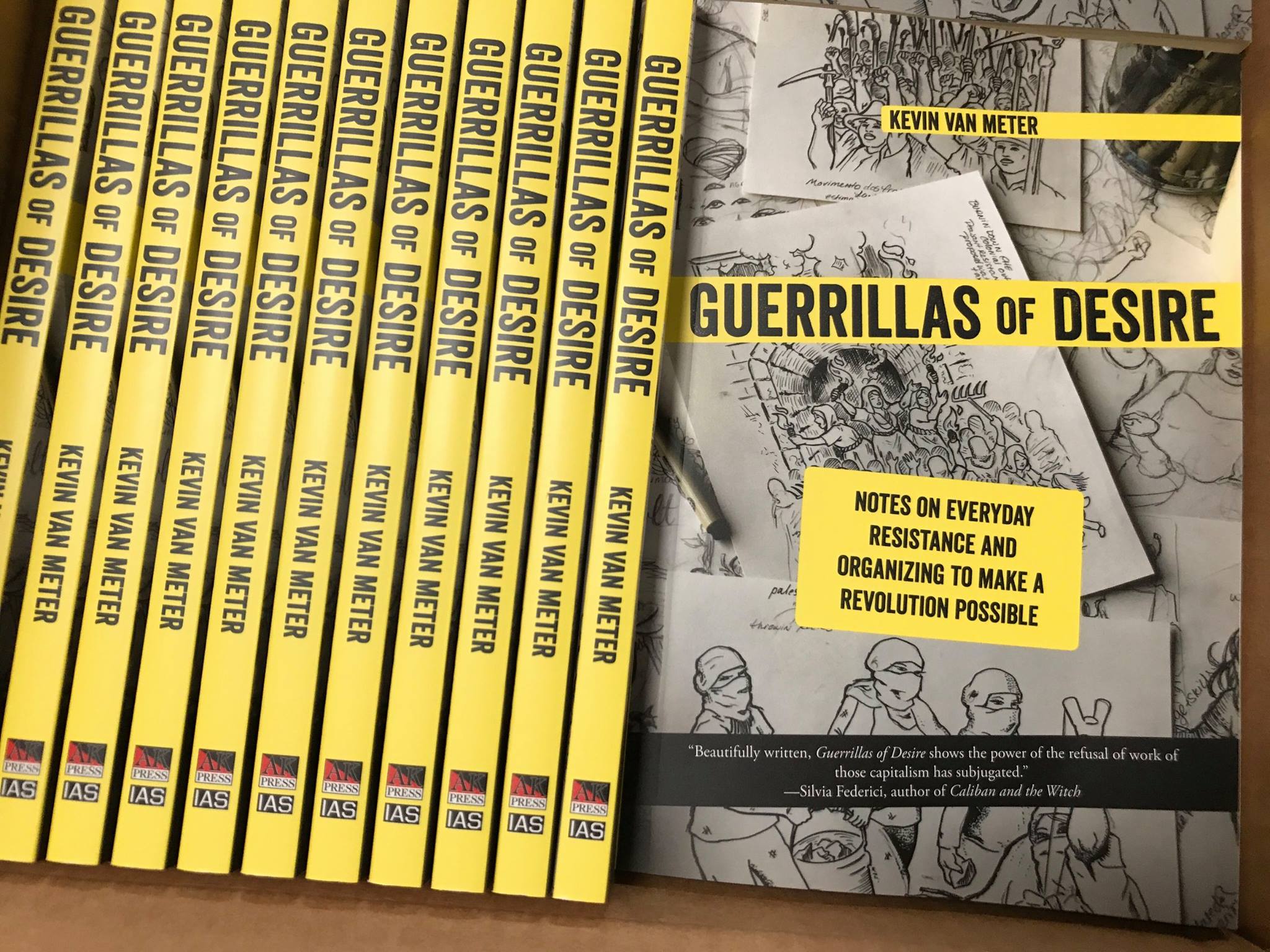
What Happened in Portland on May Day?
This May Day in Portland, Oregon about 1,500 people rallied and marched against capitalism, racism, and colonialism, including immigrant families, undocumented folks, people with disabilities, and working families with kids. It was International Workers Day, which commemorates the Haymarket affair, which took place in Chicago, … Read more
Guerrillas of Desire: New IAS Book on Everyday Resistance and Organizing Available for Preorder!

Silvia Federici says it is “beautifully written” while illustrating “the power of the refusal of work of those capitalism has subjugated.” George Caffentzis believes it is an “important exploration of the revolutionary possibilities of our time.” Kevin Van Meter’s Guerrillas of Desire: Notes on Everyday Resistance and Organizing to Make a Revolution Possible is the latest Institute of Anarchist Studies book to be published in concert with AK Press.
Perspectives available in Canada!
The current anarcha-feminisms issue of Perspectives on Anarchist Theory (n. 29), and all back issues, including:

Justice, Strategy, Care, Movements, and Climate, are now available in Canada, from Kersplebedeb Leftwing Books!
Angels with Dirty Faces wins the Oregon Book Creative Nonfiction Award!
Walidah Imarisha’s Angels with Dirty Faces, co-published by the Institute for Anarchist Studies and AK Press, won the Oregon Book Creative Nonfiction Award! Congratulations Walidah! Angels with Dirty Faces is available from AK Press here!
Free Unicorns: A Review of Queering Anarchism: Addressing and Undressing Power and Desire, edited by C.B. Daring, J. Rogue, Deric Shannon, Abbey Volcano, by Kristian Williams
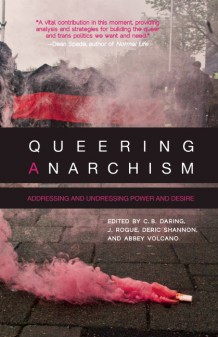 This book review appears in the current issue of Perspectives on Anarchist Theory (N. 29) available from AK Press here!
This book review appears in the current issue of Perspectives on Anarchist Theory (N. 29) available from AK Press here!
Queering Anarchism. The title suggests a process, something in motion, developing, unfolding, undefined, unsettled. Indeterminacy is part of the point of the subversion of categories, an opening of possibilities, simultaneously emphasizing and easing difference. What was once hidden becomes apparent; what was once obvious becomes absurd. Both the anarchic and the queer challenge the status quo. Both expand our sense of the possible, enlarge our idea of freedom. What happens when these two mercurial concepts come into contact?
In making the attempt, Queering Anarchism accomplishes something remarkable, providing a good, quick orientation to anarchism and a short introduction to queer politics and queer theory. And by relating the two, it enacts a kind of intervention into each. The book’s twenty-one chapters show that queer politics needs an analysis of class and power, and that the anarchist critique of capitalism and the state has much to gain by incorporating questions of gender and sexuality. The contributors consider the multiple ways that power relations shape our sex lives, our gender expressions, our family arrangements, our sense of self and belonging, and even our desires, fantasies, and entertainment. Conversely, they also explore the ways that freedom might change those things and moreover, how changing them might in turn transform our understanding of freedom. As Jerimarie Liesegang writes in “Tyranny of the State and Trans Liberation”:
Whereas anarchists and anarchist theory need to look at struggle on the conceptual level that queer theory provides, queer theory needs to be coupled with anarchism’s critique of structural domination, such as the state and capitalism. (96)
If that sounds a bit like a dare, it is a dare worth taking.
Radical Language in the Mainstream, by Kelsey Cham C.
This essay appears in the current issue of Perspectives on Anarchist Theory (N. 29), available here, from AK Press!
As a person who did not come to radical perspectives from academia, I’ve had quite the challenge trying to find community with people whose politics I respect.
I grew up in the suburb of Newton, Surrey, territory of the Katzie, Kwantlen, Semiahmoo and Tsawwassen peoples. I was an athlete and last-minute procrastinator who never understood why school should be taken seriously. Though I read newspapers every day, I didn’t have the words to describe the injustices I could see and feel. My lack of trust in the school system, and my dwindling trust in the politics of high level sports led me to believe I didn’t need validation from institutions. In grade 8, I started skipping class to find freedom. A couple of years later I found myself getting into hard drugs and failing classes. Eventually, I failed out of high school completely and was pretty proud about it.
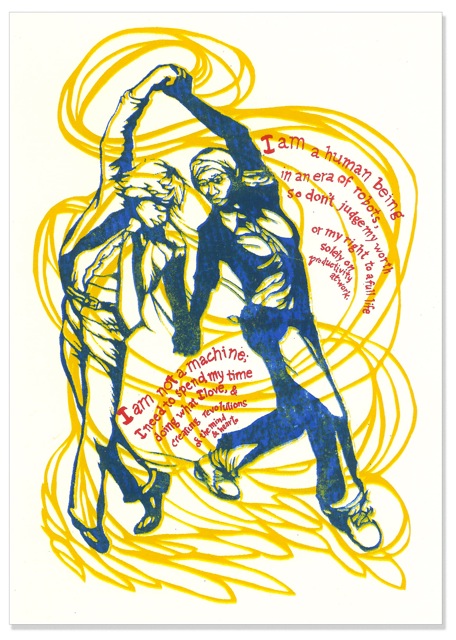
More than a missing diploma, more than my struggle with addiction, my biggest barrier to finding community in radical circles was a lack of exposure to their social expectations. I found very little compassion and support, and was often met with harsh judgment. Coming into these communities, I felt not smart enough and like an outcast. It took me years to understand the everyday language used in radical activist communities. Some words were long, some were short, but everyone said these words so casually I thought I would come across as stupid to ask what they meant. I’d go to talks and workshops, and some really smart dude would talk for an hour and then open up the space for questions. I remember feeling so lost by the jargon that by the end, I didn’t even know what the talk had been about. Clearly, I wasn’t going to ask the questions running around in my brain. “What do you mean by colonization?” “What is queer theory?” “Who is Marx!?” “Why are you speaking to us like my boring geography teacher?”
Indigenist Intersectionality: Decolonizing an Indigenous Eco-Queer Feminism and Anarchism, by Laura Hall
This essay appears in the current anarcha-feminisms issue of Perspectives on Anarchist Theory (N. 29), available here from AK Press! Laura received an Institute for Anarchist Studies writing grant to complete this piece.
The violence enacted against Indigenous women and Two-Spirit/LGBTQ people evokes deep questions about the intent and impact of colonization in a Canadian settler and state context. The horrors of colonial violence—bodies were violated and abandoned at the sides of highways, in ditches, in rivers—tell stories of the vital importance of Indigenous women’s leadership, their warriorhood, their gifts and their medicines, and also of the centrality of gendered freedom and fluid belonging in Indigenous cultures. It is a system of colonization that seeks to erase and subsume these realities and to replace Indigenous truth with illusions of our weakness. We are at a pivotal moment now as state and settler voices seek to understand what is needed, and it is a pivotal moment best informed by threads of anarchist and feminist thought woven within Indigenous worldviews. Vital intersections are made between gender and Indigeneity because the conversation is always in danger of being rerouted by policing and state voices, as well as settler voices.1 The work that Indigenous women and Two-Spirit/LGBTQ people do on the ground—to renew our connections to culture, to renew the innovations and economies of our nations—needs more support in every way, from allies across intellectual lines.
